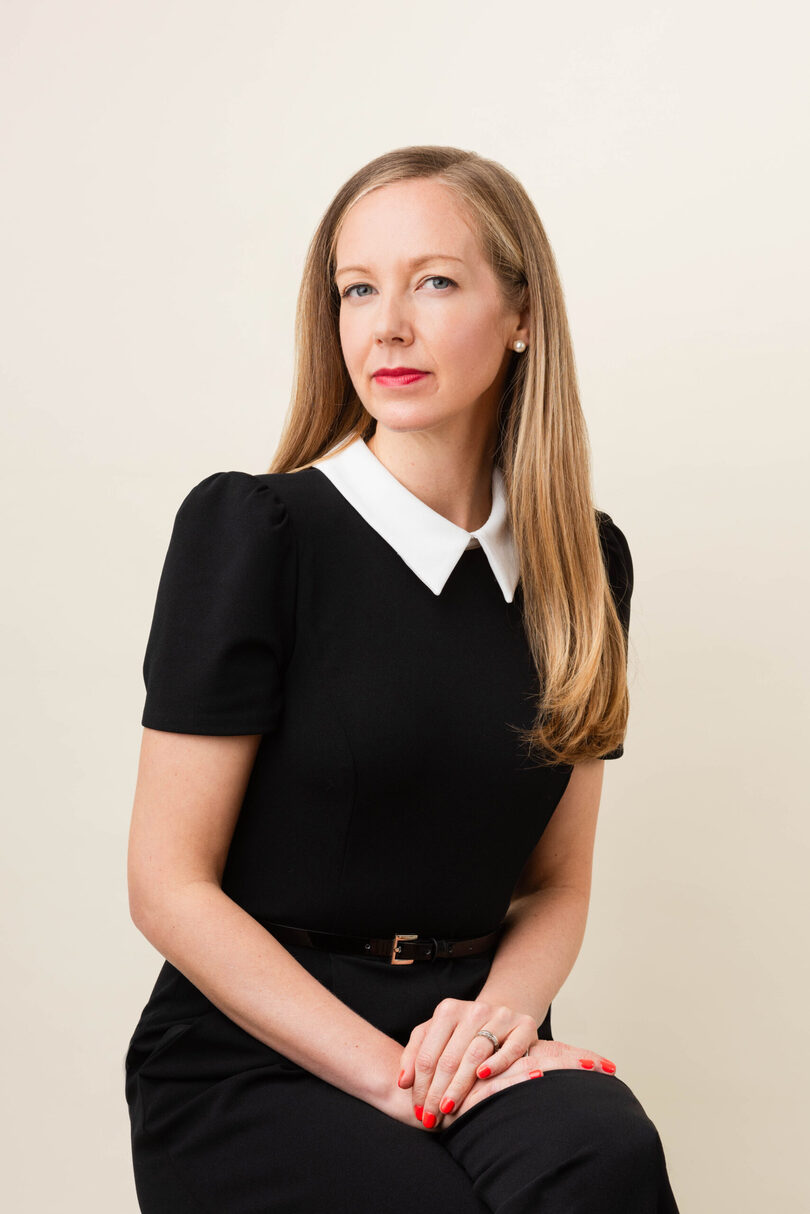SU alumna calls airport’s dismissal of her sexual harassment ad ‘censorship’

Syracuse University alumna Megan Thomas claims Syracuse Regional Airport Authority’s dismissal of her law firm’s sexual harassment ad is unfair censorship and reflects gender bias. Her trial against authority is set for Nov. 12. Courtesy of Megan K. Thomas
Get the latest Syracuse news delivered right to your inbox.
Subscribe to our newsletter here.
When it came time for workplace harassment lawyer Megan Thomas to create an advertisement for her new law firm, she said placing it at the Syracuse Hancock Airport seemed obvious.
Thomas, an alumna of both Syracuse University’s Maxwell School of Citizenship and Public Affairs and Syracuse University’s College of Law programs, said many of her clients since opening her firm last year have reported experiences of workplace coercion occurring on business trips, flying to meet superiors or going to a corporate retreat.
Thomas started working with the airport’s advertising manager in late June, where she was assigned a contracted designer.
But after weeks of correspondence, brainstorming with the airport and signing a contract, the airport ultimately refused to display the ad with its slogan reading “When HR called it ‘harmless flirting’ … we called it exhibit A.”
The rejection prompted Thomas to file a federal complaint to the United States Northern District Court of New York, claiming she was unfairly censored and discriminated against by the Syracuse Regional Airport Authority, violating her First Amendment rights. This is in addition to not fulfilling her contract, which said the ad would be displayed the week of Aug. 1.
“I don’t feel like my male counterparts are being told they cannot put up advertisements,” Thomas said. “I worked really hard to be where I am, I’m successful enough to be able to afford a billboard and yet I’m being told I’m not allowed to.”
SRAA officials did not respond to The Daily Orange’s requests for comment. However, in a statement to syracuse.com, airport management said the message in Thomas’s sign was “unprofessional, inflammatory, and unnecessary.”
SU Communications Law professor Roy Gutterman said litigating on the basis of First Amendment rights could be difficult for Thomas compared to an issue of political speech.
“On its face, it appears like this is a form of government censorship, but because it involves (the) selection of advertisements, I think the airport is free to decide who has the right to pay for advertising space,” Gutterman said.
If the airport is rejecting the advertisement on the basis that people may be offended by one type of ad and not another, Gutterman said, there might be an “inconsistent application of standards.”
Pitching the ad
Thomas initially inquired about putting up an ad at the airport on June 27, according to an email highlighted in Thomas’s complaint. On July 15, Thomas signed a six-month advertising contract with the airport, which said the ad would be posted Aug. 1 through Jan. 31, 2026.
The contract also stated that “all artwork must be approved by the airport prior to final production.”
The same day, Linda Ryan, the airport’s director of Business Development, connected Thomas with a contracted graphic designer to create her ad, an email filed with the complaint shows.
Thomas claims the airport “rushed” her to complete the ad by July 22, eager to get it up for the airport’s summer travel season. Thomas said she paid $535 to the graphic designer for the ad.
Ad approval
On July 22, nine days before the ad was set to air, the designer sent the completed ad to airport officials, according to an additional email in the complaint.
The next day, Ryan sent an email to Thomas, also attached to the complaint, claiming the ad’s language was “a bit harsh,” and requested she “tone down the wording on the top a little bit” for the ad to be approved.
In a follow-up email attached to the complaint, Thomas responded to Ryan with a list of alternative slogans, which still include the tagline “Exhibit A,” and original artwork of a chat bubble next to Thomas’s portrait. New slogans she provided were “When your raise disappeared after you said no — that’s Exhibit A” and “They called it locker room talk. We called it Exhibit A.”
In a July 26 email, included in the complaint, Jason Mehl, the airport’s Chief Commercial Officer, gave Thomas “a few softer alternative lines” for her slogan, including “when your concerns were brushed aside, we took them seriously” and “You deserve to be heard. We make sure you are.”
“(The slogans) were frankly horrible,” Thomas said. “They were so verbose and watered down my ad.”
In the email, Mehl wrote that while he supported the creative messaging behind the ad, the airport is working to grow its advertising and has “become increasingly mindful of messaging tone.”

Courtesy of Megan K. Thomas
Thomas’s proposed advertisement at the Syracuse Hancock International Airport was initially rejected by the airport management due to its slogan.
“Because advertising at the airport is inherently a reflection of the Syracuse Regional Airport Authority, we’ve found ourselves needing to be more thoughtful about how new campaigns may be received by a broader audience,” Mehl wrote.
During a phone call, Thomas said Mehl told her local politicians could feel uncomfortable with the ad’s language. Subsequently, she wrote to her local representatives.
New York State Senator Rachel May, whose district includes Syracuse, said the airport’s actions “appear to be an effort to censor content that empowers women,” in a Monday statement to The D.O.
“Would the airport authority hesitate to display an ad for a law firm that helps people get settlements in accident cases? Or for a job placement agency? This advertisement for legal assistance in employment disputes is no different from those,” May wrote.
On July 29, Thomas wrote a letter to Mehl, attached in the complaint, threatening a lawsuit against the airport if the ad wasn’t displayed by Aug. 1. She also submitted a New York Freedom of Information Law request to show a record of advertisement rejections.
The next day, she received an email from John Clark, the airport’s lawyer, who said he would respond to the FOIL request and other issues raised in the letter by Aug. 11. Clark said many of the personnel involved with the ad were on vacation at the time.
In an Aug. 5 email to Thomas, Clark claimed the airport was not in violation of the ad’s contract because the airport tried to negotiate with Thomas, but Thomas “immediately threatened litigation.”
Filing a lawsuit
On Aug. 15, she filed the federal complaint against the Syracuse Regional Airport Authority, Mehl and Executive Director Jason Terrari for violations of her First, Fifth and Fourteenth Amendment rights.
In the July 29 letter to Mehl, Thomas cited preceding supreme and federal district court rulings that say speech limits in nonpublic forums must be reasonable and not aimed at silencing views that officials oppose.
Thomas also said the airport displays many ads for breast augmentation and plastic surgeons, which she says many women could find “offensive.”
“I have no problem with (these ads), but to only have that viewpoint, and then not allow the viewpoint of women standing up for themselves at work, I think is incredibly problematic,” Thomas said. “It sends the wrong message, and the message is being controlled by people with a certain viewpoint about women.”
As of Tuesday night, Thomas said she is going to court on Nov. 12.
Thomas’s next steps
Thomas has gathered over 1,000 signatures condemning the airport in an online petition.
While Thomas said companies like Centro have offered to display her ad, she said she has no plans to advertise anywhere else until her ad is displayed at the airport.
“If (people) see my ad when they’re going to or from a business trip, they’ll think ‘I do have rights and there is someone there who can help protect me.’”
CORRECTION: A previous version of this article stated Thomas’ trial begins on Nov. 12. Thomas has a court date on Nov. 12. The Daily Orange regrets this error.





